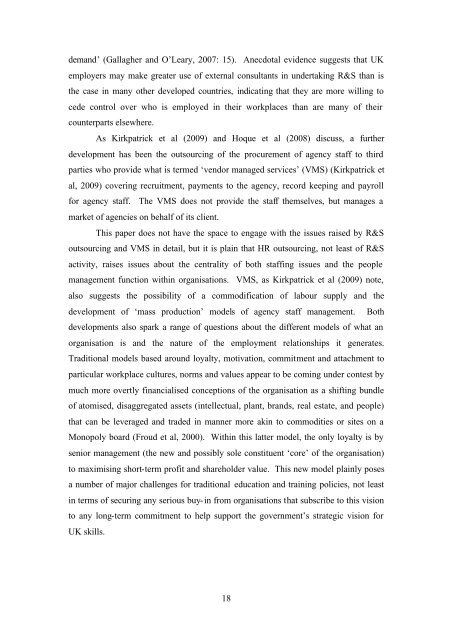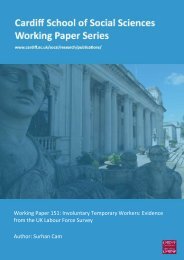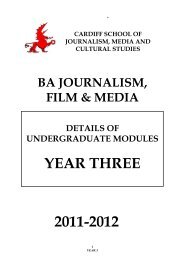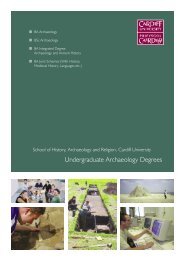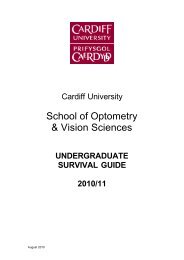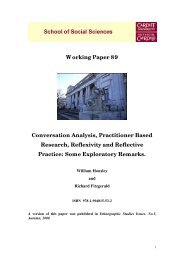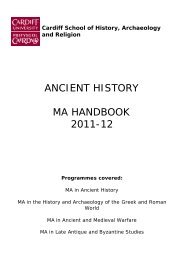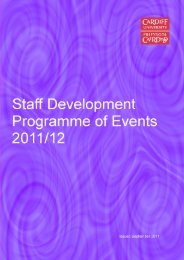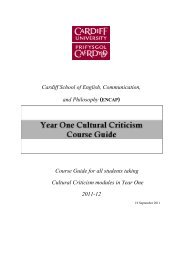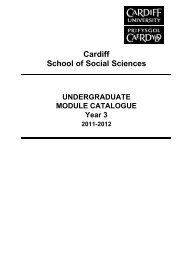Recruitment and Selection â the Great Neglected ... - Cardiff University
Recruitment and Selection â the Great Neglected ... - Cardiff University
Recruitment and Selection â the Great Neglected ... - Cardiff University
You also want an ePaper? Increase the reach of your titles
YUMPU automatically turns print PDFs into web optimized ePapers that Google loves.
dem<strong>and</strong>’ (Gallagher <strong>and</strong> O’Leary, 2007: 15). Anecdotal evidence suggests that UK<br />
employers may make greater use of external consultants in undertaking R&S than is<br />
<strong>the</strong> case in many o<strong>the</strong>r developed countries, indicating that <strong>the</strong>y are more willing to<br />
cede control over who is employed in <strong>the</strong>ir workplaces than are many of <strong>the</strong>ir<br />
counterparts elsewhere.<br />
As Kirkpatrick et al (2009) <strong>and</strong> Hoque et al (2008) discuss, a fur<strong>the</strong>r<br />
development has been <strong>the</strong> outsourcing of <strong>the</strong> procurement of agency staff to third<br />
parties who provide what is termed ‘vendor managed services’ (VMS) (Kirkpatrick et<br />
al, 2009) covering recruitment, payments to <strong>the</strong> agency, record keeping <strong>and</strong> payroll<br />
for agency staff. The VMS does not provide <strong>the</strong> staff <strong>the</strong>mselves, but manages a<br />
market of agencies on behalf of its client.<br />
This paper does not have <strong>the</strong> space to engage with <strong>the</strong> issues raised by R&S<br />
outsourcing <strong>and</strong> VMS in detail, but it is plain that HR outsourcing, not least of R&S<br />
activity, raises issues about <strong>the</strong> centrality of both staffing issues <strong>and</strong> <strong>the</strong> people<br />
management function within organisations. VMS, as Kirkpatrick et al (2009) note,<br />
also suggests <strong>the</strong> possibility of a commodification of labour supply <strong>and</strong> <strong>the</strong><br />
development of ‘mass production’ models of agency staff management. Both<br />
developments also spark a range of questions about <strong>the</strong> different models of what an<br />
organisation is <strong>and</strong> <strong>the</strong> nature of <strong>the</strong> employment relationships it generates.<br />
Traditional models based around loyalty, motivation, commitment <strong>and</strong> attachment to<br />
particular workplace cultures, norms <strong>and</strong> values appear to be coming under contest by<br />
much more overtly financialised conceptions of <strong>the</strong> organisation as a shifting bundle<br />
of atomised, disaggregated assets (intellectual, plant, br<strong>and</strong>s, real estate, <strong>and</strong> people)<br />
that can be leveraged <strong>and</strong> traded in manner more akin to commodities or sites on a<br />
Monopoly board (Froud et al, 2000). Within this latter model, <strong>the</strong> only loyalty is by<br />
senior management (<strong>the</strong> new <strong>and</strong> possibly sole constituent ‘core’ of <strong>the</strong> organisation)<br />
to maximising short-term profit <strong>and</strong> shareholder value. This new model plainly poses<br />
a number of major challenges for traditional education <strong>and</strong> training policies, not least<br />
in terms of securing any serious buy-in from organisations that subscribe to this vision<br />
to any long-term commitment to help support <strong>the</strong> government’s strategic vision for<br />
UK skills.<br />
18


